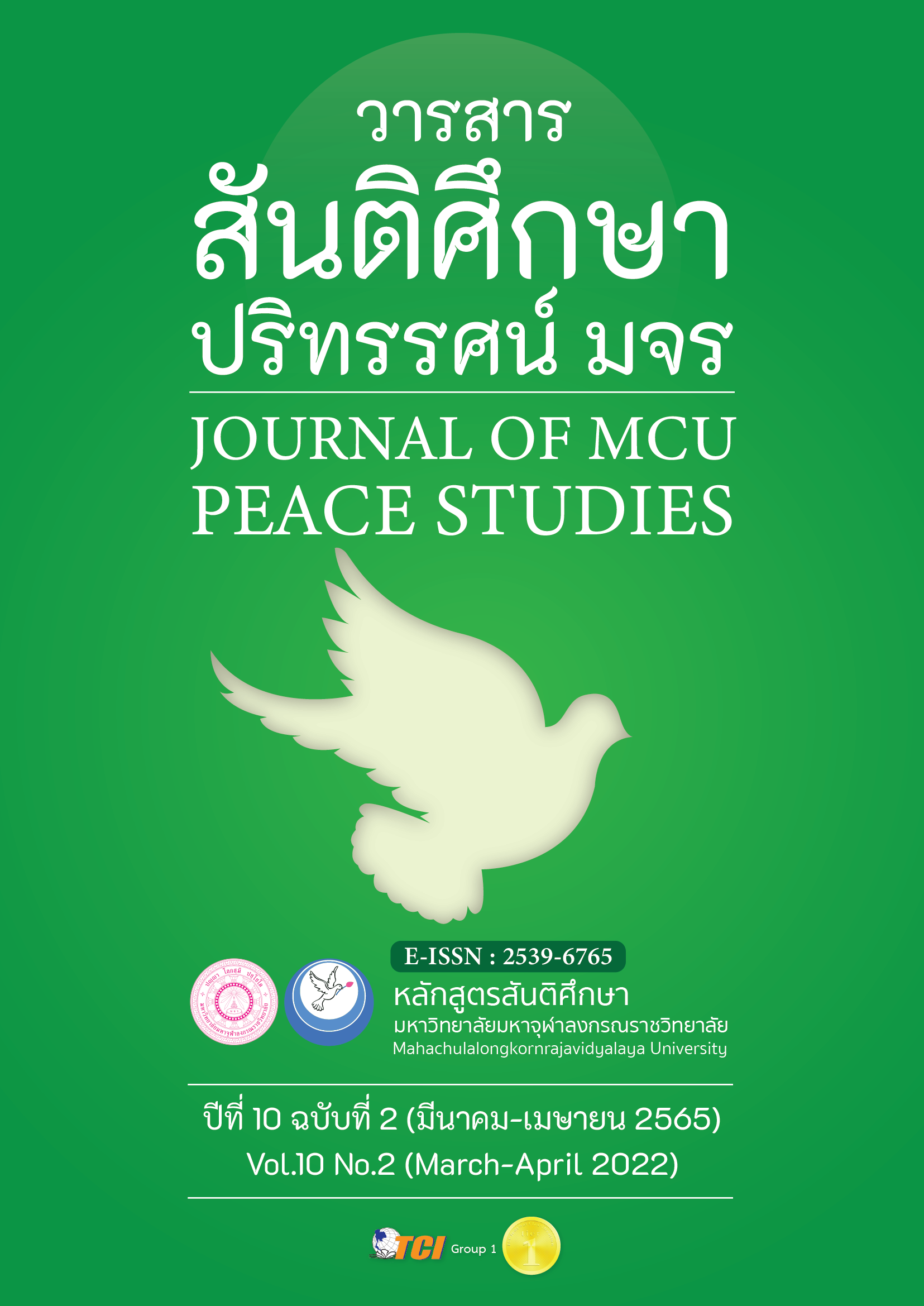A Study of Factors Affecting the Achievement of Online Learning of Students Under the Spread of the COVID-19 Virus
Main Article Content
Abstract
The research article aimed at 1) investigating the level of factors and achievement of online teaching and learning; and 2) exploring factors influencing secondary school students' achievement in online teaching and learning in public schools of Eastern Provincial Cluster 1. The study used a field study approach to collect data from 400 parents. The multiple regression analysis was conducted to analyze data in order to respond to the research questions.
From the study, the findings found that the level of factors is as follows: (1) On preparedness of the facility with a mean of 3.763; (2) On lessons with a mean of 3.652; (3) On students with a mean of 3.709; (4) On teachers with a mean of 3.728; and (5) On environment with a mean of 3.756. All of these 5 factors are at a high level. The achievement of online teaching and learning is as follows: (1) On learning outcomes with a mean of 3.728; (2) On attitude with a mean of 3.744; (3) On participation in activities with a mean of 3.729; and (4) On satisfaction with a mean of 3.731. All of these 5 components are at a high level. The factors influencing the opinions on the achievement of online teaching and learning are as follows: (1) On preparedness of the facility consisting of 4 sub-factors with the predictive power at 7.90; (2) On lessons consisting of 5 sub-factors with the predictive power at 23.80; (3) On students consisting of 7 sub-factors with the predictive power at 33.30; (4) On teachers consisting of 8 sub-factors with the predictive power at 33.10; and (5) On environment consisting of 4 sub-factors with the predictive power at 18.30 at a statistical significance of 0.05 level.
Article Details

This work is licensed under a Creative Commons Attribution-NonCommercial-NoDerivatives 4.0 International License.
Views and opinions expressed in the articles published by The Journal of MCU Peace Studies, are of responsibility by such authors but not the editors and do not necessarily reflect those of the editors.
References
Alibak, M., Talebi, H., & Neshatdoost, H. (2019). Development and Validation of a Test Anxiety Inventory for Online Learning Students. Journal of Educators Online 2019, 16(2), 5-12.
Alicai, L. (2006). Reading and the Internet: A Comparison of Reading on the Internet and Reading Print in French by French Immersion Student. Retrieved August 7, 2021, from http://www.lib.umi.com/dissertations/fillcil/
Anastasi, A. (1970). On the formation of psychological traits. American Psychologist, 25(10), 99–910.
Beaudrie, B. P. (2000). Analysis of group problem-solving tasks in a geometry course for teachers using computer-mediated conferencing. (Doctoral Dissertation). Montana State University. Bozeman.
Bloom, B. (1976). Human Characteristic and School Learning. New York: McGraw-Hill.
Carter, B. M., & Krulik, S. (2004). An analysis and comparison of the effects of computerassisted instruction versus traditional lecture instruction on student attitudes and achievement in a college remedial mathematics course. Founder's Garden: Temple University.
Daniel, D.R. (1961). Management Information Crisis. Harvard Business Review, 39(5), 80-85.
Davis, L. E. (1977). Enhancing the quality of work life: Development in the United States. International Labor Review, 116, 47-53.
Hill, B. (2020). Coronavirus: origins, signs, prevention and management of patients. British Journal of Nursing, 29(7), 399-402.
Laorungruang, J. (2018). The Internet use behavior and academic achievement. A case study of students of Rajamangala University of Technology Phra Nakhon. (Master’s Thesis). Thammasat University. Bangkok.
Michels, D.M. (2006). Two-Years Colleges and Internet: An Investigation of the Integration Practices and Beliefs of Faculty User. Minneapolis, MN: University of Minesota.
Mohammadi, N., Ghorbani, V., & Hamidi, F. (2011). Effects of e-learning on Language Learning. Procedia Computer Science, 3, 464-468.
Nawarat, S. (2018). Factors affecting academic achievement according to students' opinions. Professional certificate level Commercial branch of a vocational school. (Master’s Thesis), Siam University. Bangkok.
Office of the Higher Education Commission. (2018). 20-year long-term higher education plan 2018 – 2037. Bangkok: Chili-Wan Graphic.
Prescott, D. A. (1961). The child in the educative process. New York: McGraw - Hall.
Pornsamrit, Y, Pannee, L., & Paitoon, P. (2018). Development of e-learning lessons through a problem situation to promote academic achievement of problem situation analysis of Mathayomsuksa 2, Krathum Baen Wiset Samutkhun School. The 1 1th National Academic Conference on Education Online. Faculty of Industrial Education and Technology King Mongkut's Institute of Technology Ladkrabang.
Ruchiraphan, K. (2016). Causal relationship model of factors influencing academic achievement of students of faculty of education, Southern region Rajabhat University. Songkhla: Songkhla Rajabhat University.
Supaporn, P. (2019). E-learning development strategies to meet the needs of the 21st Century. (Master’s Thesis), College of management, Mahidol University. Nakhon Pratom.
Vasilis, G. (2013). Student teachers’ perception about the impact of internet usage on their learning and jobs. Online Information Review ELSEVIER Computer & Education, 62, 1–7.
Yamane, T. (1967). Statistics: An Introductory Analysis (2nd Ed.). New York: Harper and Row.


